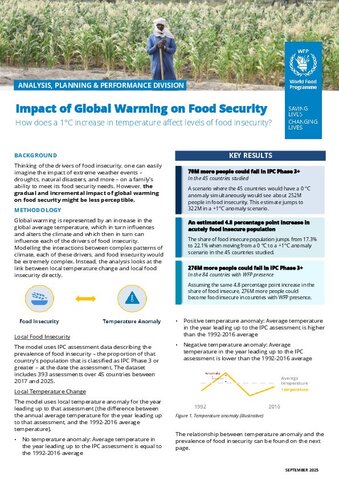
Climate change is increasingly shaping the lives and livelihoods of vulnerable communities. To better understand this impact, WFP analysed data from 393 Integrated Food Security Phase Classification (IPC) assessments carried out in 45 countries between 2017 and 2025, looking at how changes in local temperature relate to levels of acute food insecurity.
The study finds a clear relationship: when local temperatures rise by 1°C above the long-term average, the proportion of people facing IPC Phase 3 or worse increases. Across the 45 countries analysed, this shift is equivalent to around 70 million additional people becoming acutely food insecure – a rise of 4.8 percentage points.
If the same increase were to occur across all 84 countries where WFP has a presence, as many as 276 million more people could be affected. This study notes that this wider estimate carries considerable uncertainty and may be an overstatement, as countries outside the original sample appear less sensitive to temperature changes. The results also show that countries experience these impacts differently. Some – such as Haiti and Yemen – see particularly large increases in projected food insecurity under a 1°C warming scenario.
Overall, the study reinforces how rising temperatures can deepen existing vulnerabilities, highlighting the importance of climate-informed action to protect food security in a warming world.
WFP. 2025. Impact of Global Warming on Food Security: How Does a 1°C Increase in Temperature Affect Levels of Food Insecurity? Rome.
